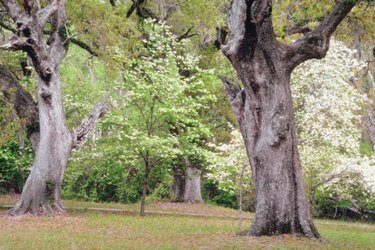
Dogwood trees (Cornus spp.) dazzle with their spring displays of blooms on horizontal branches. You'll find pink dogwoods, white dogwoods and yellow dogwoods from which to choose. When selecting a dogwood species for Pennsylvania, consider the tree's hardiness as well as its disease resistance and adaptability. Dogwood trees are hardy in U.S. Department of Agriculture plant hardiness zones 4 to 9, though the range varies by species.
Dogwood Trees for Sale
Video of the Day
Botanists have identified somewhere between 30 to 60 species of dogwood trees, of which about 17 are native to North America. One of the most popular and showy species is the flowering dogwood (Cornus florida), which is native to eastern North America. The range of the flowering dogwood extends from southern Canada to northern Mexico and includes much of Pennsylvania. This species flowers in early spring, usually in April.
Video of the Day
Another good option for Pennsylvania is the kousa dogwood (Cornus kousa), which is native to Asia. The Japanese dogwood blooms later in May and June and offers a great red fall color. The cornelian cherry dogwood (Cornus mas), which is native to Europe and western Asia, blooms in March before the leaves emerge, making it one of the earlier-blooming dogwoods. The cornelian cherry dogwood's bloom is not as showy as the other species, however.
One species of dogwood to avoid in Pennsylvania is the Pacific dogwood (Cornus nuttallii), also known as the mountain dogwood, which is native to the Western United States. The Pacific dogwood is only hardy in zones 7 and 9 and is therefore not well suited for frigid Pennsylvania winters.
Dogwood Growing Conditions
When selecting a planting site for a dogwood tree in Pennsylvania, it is important to consider the soil. Dogwood trees generally prefer a pH between 5.5 and 6.6, which is slightly acidic. It is best to conduct a soil test before planting dogwoods, but if the pH is difficult to determine, you may consider planting a cornelian cherry dogwood, which is an adaptable species that can grow in alkaline soils.
Dogwood trees grow best in full sun to part shade. The kousa dogwoods often handle hot afternoon sun better than the flowering dogwood. Moist, well-drained soils are ideal for these trees.
Dogwood Tree Problems
Dogwood trees are susceptible to a number of diseases, one of the most serious of which is anthracnose, which is caused by a fungus that damages the dogwood tree leaves and can prove fatal if not caught in time to remove affected branches. When choosing a dogwood tree for Pennsylvania, you might therefore want to choose a species that is resistant to anthracnose. While the flowering dogwood is extremely vulnerable, both the kousa dogwood and the cornelian cherry dogwood are less likely to succumb to the disease.
Kousa dogwoods and cornelian cherry dogwoods are also considered more resistant to powdery mildew, which is a fungal disease that affects the leaves. In addition, compared to the flowering dogwood, the kousa and cornelian cherry dogwood species have also shown to be more resistant to infestations by the dogwood borer, a serious pest that carves tunnels under the bark of the tree.
- UConn Home & Garden Education Center: Dogwoods
- Missouri Botanical Garden: Cornus mas
- Missouri Botanical Garden: Cornus florida
- Missouri Botanical Garden: Cornus nuttallii
- The University of Tennessee Agricultural Extension Service: Dogwoods for American Gardens
- PennState Extension: When Corneliancherry Dogwood Blooms, Spring is Not Far Behind
- PennState Extension: Dogwood Diseases
- Clemson Cooperative Extension: Dogwood